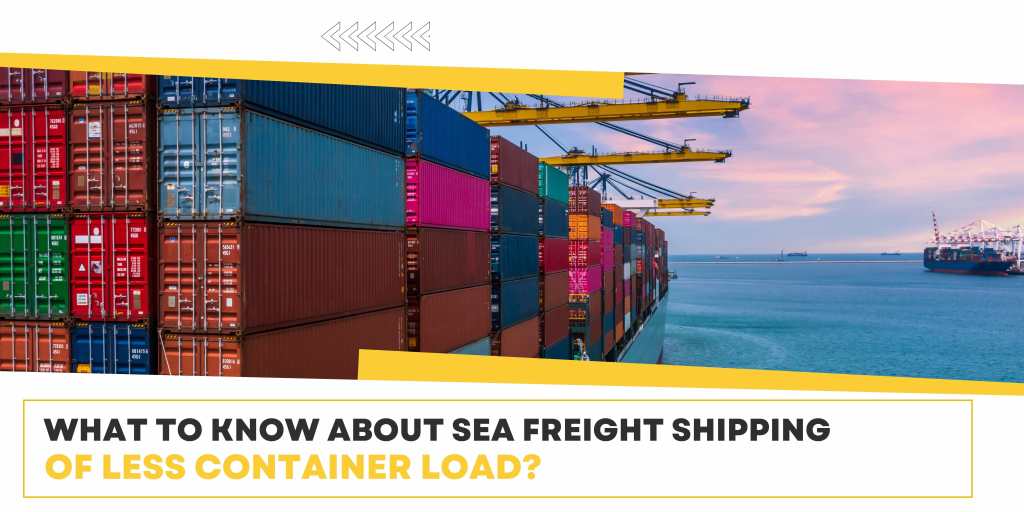Everything To Know About Sea Freight Shipping of Less Container Load
Businesses have access to a variety of transportation options for shipping their goods. Low container load (LCL) marine freight is one choice. LCL is a fantastic choice for companies that want to reduce their transportation expenses and have extra time.

What is the Sea Freight of LCL?
A shared container is used in LCL shipping, which is a way of sending products via ocean freight. Small enterprises or private individuals who need to ship less than a full container load (FCL) of products should choose this sort of shipping. For people who are new to international shipping, LCL shipping is frequently more affordable and practical than FCL shipping.
What Is the LCL Sea Freight Process?
Smaller shipments that don't fill an entire container are shipped using the LCL, or less than container load, method of transportation. Commercial shipping frequently involves this method since it is less expensive than air freight or shipping in full containers.
To save expenses, LCL shipments are combined with other goods going to the same location. Your shipment will be loaded into a container that is shared with other cargo before being unloaded at the port of arrival.
Make sure to compare prices from other freight forwarders if you're thinking about using LCL shipping for your subsequent shipment to get the best deal.
For your goods and transportation, choose the best shipping business offering sea freight shipping services.
The Benefits of LCL Sea Freight
Shipping LCL (less than a container load) by sea freight has a lot of advantages. The most obvious advantage is probably that shipping through sea freight service is typically less expensive than shipping via air freight. This is because delivering larger quantities of commodities results in economies of scale.
The flexibility of LCL sea freight is another advantage over airfreight shipping. As a result, you can spend less on products and are not required to wait until you have a full container load to export your goods.
As a door-to-door service, LCL shipping has the advantage of relieving you of the burden of planning transportation from the port to your final destination.
LCL sea freight offers additional advantages as well, such as:
- Fewer breakages and damage: Your items are better protected from harm when transported in a shared container since they are supported by other cargo.
- Documentation: Minimal paperwork is required for LCL shipments compared to FCL shipments (full container load).
- Enhanced security: Because your goods are transported in a shared container, they are less likely to be the target of thieves or customs agents.
How to Ship LCL Goods?
Even though shipping LCL—less than a full container load—cargo can be more expensive than shipping FCL—full container load—there are still several advantages to exporting LCL. The following advice will help you make the most of your LCL shipment:
1. Confirm that you are aware of the distinction between LCL and FCL. Although LCL is more expensive than FCL, as we have discussed, it also provides a unique set of advantages. Before making a choice, be sure you are aware of these advantages.
2. Track down a reliable shipping business. When exporting LCL, this is crucial since you want to be sure that your goods are in capable hands. Before selecting a shipping business, do some research and read reviews.
3. Choose the appropriate packing. This is crucial for any shipping type, but it's crucial for LCL shipments in particular because your cargo will be handled more frequently throughout transit. Make sure your packaging is durable enough to handle some abuse.
4. Clearly label all of your packages. This will make it easier for the shipping firm to monitor your shipment and ensure that it reaches its destination without incident.
5. Get shipping insurance. We constantly advise you to have your shipments insured.
Advice on Shipping LCL Cargo
There are a few things you can do to make the shipping of LCL cargo run more smoothly. Here is a few advice:
- Ensure that your goods are securely packed. This will lessen the chance of transit-related damage.
- Pay attention to the weather report. If inclement weather is predicted, it might be prudent to postpone your shipping.
- Pick a trustworthy sea freight shipping company. Be sure they have a solid track record of delivering LCL goods safely and on time by doing some research.
When transporting goods by water, there are several things to take into account, including the kind of cargo, the final location, and the shipping firm you select. Shipping smaller loads or things that are not suitable for a full container is sometimes done using LCL (less container load). Consider using LCL for your upcoming shipment, but be sure to shop around and compare prices from several suppliers to be sure you're getting the best deal.
Post Your Ad Here
Comments